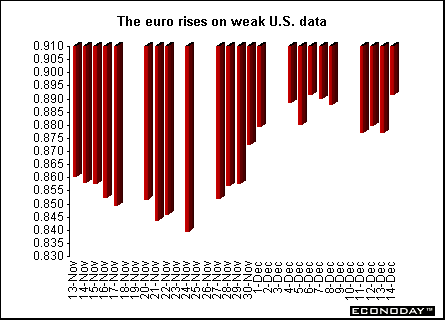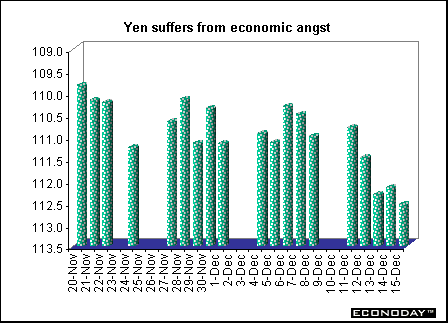
Currencies
The euro rose again last week, confounding those who had expected the dollar to get a bounce out of the resolution of the U.S. election. But now that the election is settled, traders are expressing heightened concerns that President elect George W. Bush may have difficulties in handling the U.S. economy unless he surrounds himself with market savvy advisors, especially at the Treasury. They are also skeptical about his ability to muster bipartisan congressional support.
The euro rose against major currencies as evidence of a U.S. economic slowdown raised expectations that investors will shift funds into the EMU. With EMU interest rates on hold investors think that prospects for the interest rate gap to narrow are increasing (this of course assumes that the Federal Reserve cuts interest rates while ECB rates stay steady.) Traders say that the combination of deteriorating equity markets, slower growth and uncertainty about the composition of Bush's administration heighten the prospects for a stronger euro.

Analysts also think that with the new U.S. administration committed to tax cuts, the trajectory will be more accommodative fiscal policy and perhaps monetary policy as well, which is less dollar friendly relative to the euro.
The yen fell to a four month low against the euro and a 16 month low versus the dollar after reports last week signaled waning business confidence, a contracting economy and rising bankruptcies ahead. Because so many Japanese companies are in financial trouble, analysts think a trend of falling interest rates and a weakening yen may be ahead.

Weighing on the yen and Japanese stocks on Friday was news that two major credit unions will begin insolvency proceedings and further talk of negative revisions to fourth quarter GDP.
The public approval rating of Prime Minister Mori's cabinet has slipped to 18.1 percent, down 1.5 percentage points from last month, according to the latest poll. Mori reshuffled his Cabinet and the leadership of the ruling Liberal Democratic Party last week in another attempt to try to build support for his administration.


Introduction • Global Stock Market Indexes • Recap of Global Markets • Currencies • Indicator Scoreboard

The Bottom Line • Looking Ahead
© Econoday, 2000. All Rights Reserved.
|